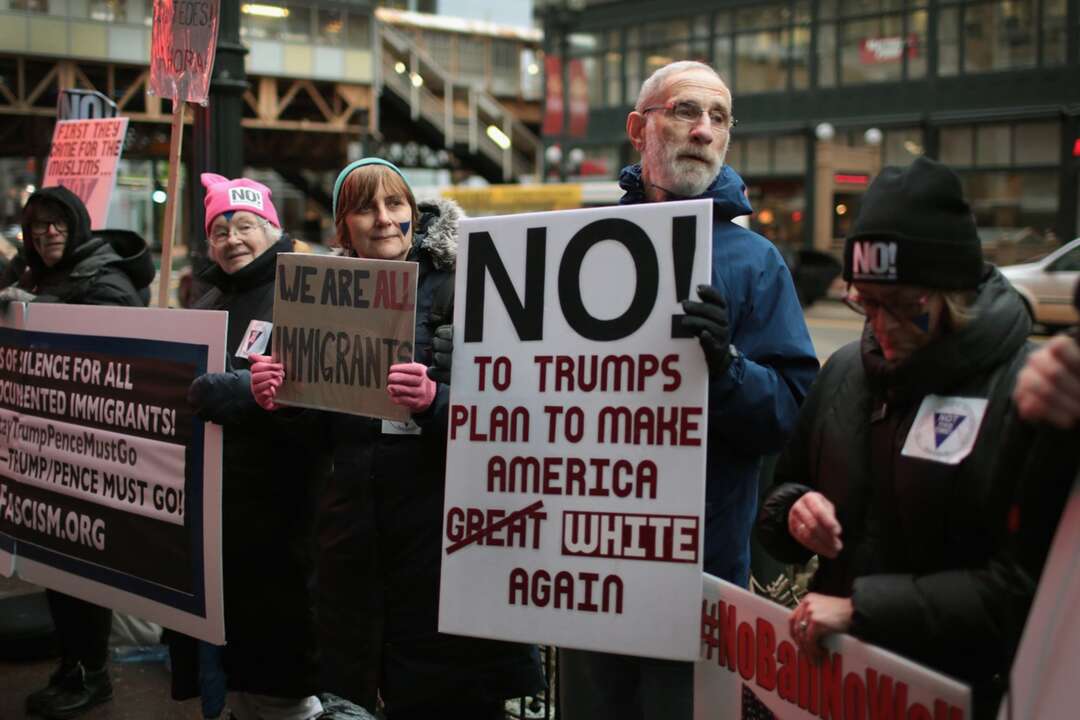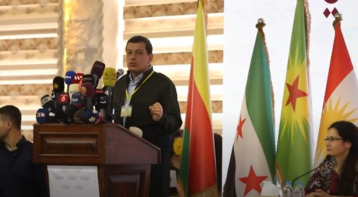-
US: New rules to deny green cards to many legal immigrants

he Trump administration announced on Monday it is moving forward with one of its most aggressive steps yet to restrict legal immigration: Denying green cards to many migrants who use Medicaid, food stamps, housing vouchers or other forms of public assistance.
Federal law already requires those seeking to become permanent residents or gain legal status to prove they will not be a burden to the US - a “public charge,” in government speak -but the new rules detail a broader range of programs that could disqualify them.
It’s part of a dramatic overhaul of the nation’s immigration system that the administration has been working to put in place, despite legal pushback.
While most attention has focused on President Donald Trump’s efforts to crack down on illegal immigration, including recent raids in Mississippi and the continued separation of migrant parents from their children, the new rules target people who entered the United States legally and are seeking permanent status.
Trump is trying to move the US toward a system that focuses on immigrants’ skills instead of emphasizing the reunification of families.
Under the new rules, US Citizenship and Immigration Services will now weigh whether applicants have received public assistance along with other factors such as education, income and health to determine whether to grant legal status.
The rules will take effect in mid-October. They don’t apply to US citizens, though immigrants related to the citizens may be subject to them.
Ken Cuccinelli, acting director of Citizenship and Immigration Services, said the rule change will ensure those who come to the country don’t become a burden, though they pay taxes.
“We want to see people coming to this country who are self-sufficient,” Cuccinelli said. “That’s a core principle of the American dream. It’s deeply embedded in our history, and particularly our history related to legal immigration.”
Migrants make up a small percentage of those who get public benefits. In fact, many are ineligible for such benefits because of their immigration status.
Immigrant rights groups strongly criticized the changes, warning the rules would scare immigrants away from asking for needed help. And they voiced concern the rules give officials too much authority to decide whether someone is likely to need public assistance in the future.
The Los Angeles-based National Immigration Law Center said it would file a lawsuit, calling the new rules an attempt to redefine the legal immigration system “in order to disenfranchise communities of color and favor the wealthy.”
And David Skorton, president and CEO of the Association of American Medical Colleges said,
“The consequences of this action will be to potentially exacerbate illnesses and increase the costs of care when their condition becomes too severe to ignore,”
“This change will worsen existing health inequities and disparities, cause further harm to many underserved and vulnerable populations and increase costs to the health care system overall, which will affect all patients,” he said in a statement.
Cuccinelli defended the move, insisting the administration was not rejecting long-held American values.
Pressed on the Emma Lazarus poem emblazoned below the Statue of Liberty that reads: “Give me your tired, your poor, your huddled masses yearning to breathe free,” he told reporters at the White House: “I’m certainly not prepared to take anything down off the Statue of Liberty.”
A new Pew Research Center survey released on Monday found the American public is broadly critical of the administration’s handling of the wave of migrants at the southern border, with nearly two-thirds of Americans - 65% - saying the federal government is doing a very bad or somewhat bad job.
The survey found broad support for developing a pathway to legal status for immigrants living in the country illegally.
On average, 544,000 people apply for green cards every year, with about 382,000 falling into categories that would be subject to the new review, according to the government.
Guidelines in use since 1999 refer to a “public charge” as someone primarily dependent on cash assistance, income maintenance or government support.
Under the new rules, the Department of Homeland Security has redefined a public charge as someone who is “more likely than not” to receive public benefits for more than 12 months within a 36-month period.
If someone uses two benefits, that is counted as two months. And the definition has been broadened to include Medicaid, housing assistance and food assistance under the Supplemental Nutrition Assistance Program, or SNAP.
Following publication of the proposed rules last fall, the Homeland Security Department received 266,000 public comments, more than triple the average number. It made a series of amendments to the final rules as a result.
For example, women who are pregnant and on Medicaid or who need public assistance will not be subject to the new rules during pregnancy or for 60 days after giving birth.
The Medicare Part D low-income subsidy also won’t be considered a public benefit. And benefits received by children until the age of 21 won’t be considered. Nor will emergency medical assistance, school lunch programs, foster care or adoption, student loans and mortgages, food pantries, homeless shelters or disaster relief.
Active US military members are also exempt, as are refugees and asylum seekers. And the rules will not be applied retroactively, officials said.
Green card hopefuls will be required to submit three years of federal tax returns in addition to a history of employment. If immigrants have private health insurance, that will weigh heavily in their favor.
According to an Associated Press analysis of census data, low-income immigrants who are not citizens use Medicaid, food aid, cash assistance and Supplemental Security Income, or SSI, at a lower rate than comparable low-income native-born adults.
Non-citizen immigrants represent 6.5% of those participating in Medicaid and 8.8% of those receiving food assistance.
The new public assistance threshold, taken together with higher requirements for education, work skills and health, will make it more difficult for immigrants to qualify for green cards, advocates say.
“Without a single change in the law by Congress, the Trump public charge rules mean many more US citizens are being and will be denied the opportunity to live together in the US with their spouses, children and parents,” said Ur Jaddou, a former Citizenship and Immigration Services chief counsel who is now director of the DHS Watch run by an immigrant advocacy group.
Jaddou added: “These are not just small changes. They are big changes with enormous consequences for US citizens.”
You May Also Like
Popular Posts
Caricature
BENEFIT Sponsors BuildHer...
- April 23, 2025
BENEFIT, the Kingdom’s innovator and leading company in Fintech and electronic financial transactions service, has sponsored the BuildHer CityHack 2025 Hackathon, a two-day event spearheaded by the College of Engineering and Technology at the Royal University for Women (RUW).
Aimed at secondary school students, the event brought together a distinguished group of academic professionals and technology experts to mentor and inspire young participants.
More than 100 high school students from across the Kingdom of Bahrain took part in the hackathon, which featured an intensive programme of training workshops and hands-on sessions. These activities were tailored to enhance participants’ critical thinking, collaborative problem-solving, and team-building capabilities, while also encouraging the development of practical and sustainable solutions to contemporary challenges using modern technological tools.
BENEFIT’s Chief Executive Mr. Abdulwahed AlJanahi, commented: “Our support for this educational hackathon reflects our long-term strategic vision to nurture the talents of emerging national youth and empower the next generation of accomplished female leaders in technology. By fostering creativity and innovation, we aim to contribute meaningfully to Bahrain’s comprehensive development goals and align with the aspirations outlined in the Kingdom’s Vision 2030—an ambition in which BENEFIT plays a central role.”
Professor Riyadh Yousif Hamzah, President of the Royal University for Women, commented: “This initiative reflects our commitment to advancing women in STEM fields. We're cultivating a generation of creative, solution-driven female leaders who will drive national development. Our partnership with BENEFIT exemplifies the powerful synergy between academia and private sector in supporting educational innovation.”
Hanan Abdulla Hasan, Senior Manager, PR & Communication at BENEFIT, said: “We are honoured to collaborate with RUW in supporting this remarkable technology-focused event. It highlights our commitment to social responsibility, and our ongoing efforts to enhance the digital and innovation capabilities of young Bahraini women and foster their ability to harness technological tools in the service of a smarter, more sustainable future.”
For his part, Dr. Humam ElAgha, Acting Dean of the College of Engineering and Technology at the University, said: “BuildHer CityHack 2025 embodies our hands-on approach to education. By tackling real-world problems through creative thinking and sustainable solutions, we're preparing women to thrive in the knowledge economy – a cornerstone of the University's vision.”
opinion
Report
ads
Newsletter
Subscribe to our mailing list to get the new updates!






















